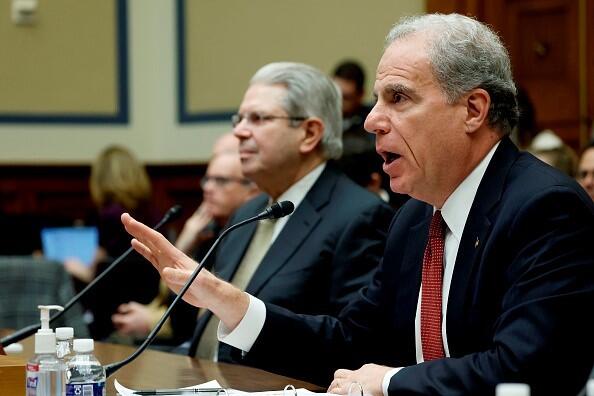Washington, DC — Michael E. Horowitz, Chair of the Pandemic Response Accountability Committee (PRAC) and Inspector General at the U.S. Department of Justice, testified before the House Committee on Oversight and Accountability on Wednesday, February 1, 2023. In his testimony, Chair Horowitz discussed the PRAC’s ongoing oversight work and achievements over the past three years and acknowledged the Committee’s support for data transparency and spending accountability. He also emphasized the long-term need for advanced data analytics to enhance the future of government oversight, as well as the PRAC’s commitment to using all of the tools Congress has made available to hold wrongdoers accountable.
“What we have sought to do at the PRAC is to build upon the prior outstanding work of the Recovery Accountability and Transparency Board while developing a new model for conducting oversight in a crisis,” said Chair Horowitz. “It is a model that should be replicated, built on a foundation of collaboration, sophisticated data analytics, and drawing on the existing capabilities of the oversight community.”
In his testimony at the hearing, Chair Horowitz also emphasized:
The need for agencies to have timely access to government information.
Identity theft has been endemic in fraud cases, often resulting in three victims: the tax-paying public, individuals these programs are intended to help, and individuals whose identities were stolen.
As Chair Horowitz noted in his testimony, the PRAC issued a Fraud Alert on January 30 highlighting the use of over 69,000 questionable Social Security Numbers (SSNs) to obtain $5.4 billion in pandemic loans and grants through the Small Business Administration’s (SBA) COVID-19 Economic Injury Disaster Loan (COVID-19 EIDL) program and Paycheck Protection Program (PPP).
L-R: Gene Dodaro, Comptroller General, U.S. Government Accountability Office; Michael Horowitz, Chair, Pandemic Response Accountability Committee and Inspector General, U.S. Department of Justice. (Photo by Anna Moneymaker/Getty Images)
“These payments could have been questioned further by SBA, before the loan and/or grant had been paid, if SBA had timely access to government information necessary to verify the accuracy of SSNs and the associated information on borrower applications, such as the applicants’ full names and dates of birth,” said Chair Horowitz.
Legislative action could sustain the capabilities of the PRAC’s advanced data analytics platform.
To properly oversee federal spending, the Inspector General community must have an effective data analytics platform.
Chair Horowitz and Comptroller General Gene Dodaro urged Congress to pass legislation extending the PRAC’s Pandemic Analytics Center of Excellence (PACE) beyond the PRAC’s scheduled sunset date of September 30, 2025. In 2021, Congress appropriated funds that allowed the PRAC to build the PACE from the ground up, leveraging leading practices and lessons learned from the Recovery Operations Center, which sunset in 2015. The PACE plays a critical role in performing antifraud analytics that bolster oversight of federal pandemic relief and help Offices of Inspectors General protect taxpayer funds and fight identity fraud.
“The sustainment of the PACE and its capabilities will ensure that our federal government is equipped with resources to face avoidable oversight risks when our country encounters its next crisis that requires emergency relief funding and effective oversight of that funding, as well the annual federal government funding that Congress appropriates,” said Chair Horowitz.
Legislative action to expand the PRAC’s ability to pursue pandemic fraudsters.
Additionally, Chair Horowitz encouraged Congress to amend the Program Fraud Civil Remedies Act to raise the jurisdictional limit for administrative recoveries from $150,000 to $1 million making it possible for the PRAC to pursue “smaller” false or fraudulent claims against the government regardless of the dollar amounts involved.
“Bipartisan legislation to make that jurisdictional change was introduced in the last Congress but was not adopted,” said Chair Horowitz. “I am hopeful that Congress will take up this legislation again.”
The 117th Congress enhanced the PRAC, the Inspector General community, and law enforcement partners’ efforts to fight fraud in small business loan programs with passage of H.R. 7352 and H.R. 7334. These bipartisan bills, signed into law in August 2022, establish a 10-year statute of limitations for all forms of PPP and COVID EIDL loan fraud. Chair Horowitz testified that the PRAC supports similar extensions of the statute of limitations for fraud in other pandemic programs, such as unemployment insurance, which will help ensure investigators and prosecutors have time to effectively pursue and hold accountable those who defrauded the programs.
The PRAC promotes transparency and collaboration across the oversight community.
One of the foundational responsibilities at the PRAC is to provide transparency to the public about pandemic-related spending, via our website PandemicOversight.gov.
Information and transparency are critical to ensuring accountability. Through the PRAC’s transparency efforts, we have empowered American taxpayers to examine how pandemic relief dollars were spent in their communities.
The PRAC continues to shine a light on what has gone well and what needs to be improved. In collaboration with member Offices of Inspector General, the PRAC is currently working on 198 pandemic oversight engagements that examine issues like public health and safety and how to prevent and detect fraud in government programs.
Read the full written testimony.
###
The PRAC was established by the CARES Act to promote transparency and support independent oversight of the funds provided by the CARES Act and other related emergency spending bills. In addition to its coordination and oversight responsibilities, the PRAC is tasked with supporting efforts to “prevent and detect fraud, waste, abuse, and mismanagement [and] mitigate major risks that cut across program and agency boundaries.”
If you have additional questions, please contact Lisa Reijula at lisa.reijula@cigie.gov


